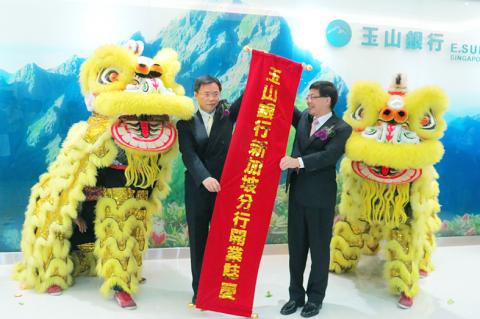E. Sun Commercial Bank (玉山銀行), the banking arm of E. Sun Financial Holding Co (玉山金控), yesterday opened a branch in Singapore as the Taiwanese lender aims to tap into the fast-growing Southeast Asian markets.
The expansion made E. Sun Bank the ninth Taiwanese lender to establish a branch in the city-state, attracted by its increasing importance as a regional financial hub, E. Sun Financial president Joseph Huang (黃男州) said in a statement.
“Riding on the trend of thriving business opportunities and economic power in ASEAN markets, E. Sun Bank has chosen Singapore as the location of its first branch in Southeast Asia,” Huang said. “The new branch will serve as the bridgehead for its [the bank’s] advancement into the region.”

Photo: CNA
As a prominent financial center and foreign exchange market in Asia, Singapore provides a great opportunity for the bank to meet its customers’ diversified financial needs, Huang said.
The Singaporean branch will join the lender’s 130 Taiwanese branches and overseas network in Hong Kong, China and the US in offering syndicated loans, treasury investment and wealth management services, the bank president said.
The branch will also provide deposit, remittance, trade services, factoring, and commercial loans for corporate and individual customers, he added.
E. Sun Bank, the main source of income for the conglomerate, has been aggressively expanding its scale of businesses at home and in the Asia-Pacific region in recent years. It acquired Chu Nan Credit-Cooperative Association (竹南信用合作社) last year and Chiayi Fourth Credit Cooperative Association (嘉義第四信用合作社) this year to boost its presence in central and southern Taiwan.
E. Sun Bank has also set up representative offices in Dongguan, China, and Ho Chi Minh City, Vietnam, that will be upgraded into branches once regulators in the respective countries give the green light, Huang said.
The lender next plans to establish representative offices in Myanmar and Cambodia, he added.
E. Sun Bank is confident of achieving double-digit growth in earnings this year fueled by a strong credit card industry as it seeks to become one of the top three Taiwanese credit card issuers, from its present fourth place ranking, after Chinatrust Commercial Bank (中國信託商銀), Cathay United Bank (國泰世華銀行) and Taishin International Bank (台新銀行), Huang said earlier.
Shares in E. Sun Financial closed down 2.22 percent at NT$15.4 yesterday, weaker than the TAIEX’s 1.90 percent decline, after rising 2.67 percent this month and 18.01 percent this year, Taiwan Stock Exchange data showed.

BYPASSING CHINA TARIFFS: In the first five months of this year, Foxconn sent US$4.4bn of iPhones to the US from India, compared with US$3.7bn in the whole of last year Nearly all the iPhones exported by Foxconn Technology Group (富士康科技集團) from India went to the US between March and last month, customs data showed, far above last year’s average of 50 percent and a clear sign of Apple Inc’s efforts to bypass high US tariffs imposed on China. The numbers, being reported by Reuters for the first time, show that Apple has realigned its India exports to almost exclusively serve the US market, when previously the devices were more widely distributed to nations including the Netherlands and the Czech Republic. During March to last month, Foxconn, known as Hon Hai Precision Industry

Taiwan Semiconductor Manufacturing Co (TSMC, 台積電) and the University of Tokyo (UTokyo) yesterday announced the launch of the TSMC-UTokyo Lab to promote advanced semiconductor research, education and talent development. The lab is TSMC’s first laboratory collaboration with a university outside Taiwan, the company said in a statement. The lab would leverage “the extensive knowledge, experience, and creativity” of both institutions, the company said. It is located in the Asano Section of UTokyo’s Hongo, Tokyo, campus and would be managed by UTokyo faculty, guided by directors from UTokyo and TSMC, the company said. TSMC began working with UTokyo in 2019, resulting in 21 research projects,

Taiwan’s property market is entering a freeze, with mortgage activity across the nation’s six largest cities plummeting in the first quarter, H&B Realty Co (住商不動產) said yesterday, citing mounting pressure on housing demand amid tighter lending rules and regulatory curbs. Mortgage applications in Taipei, New Taipei City, Taoyuan, Taichung, Tainan and Kaohsiung totaled 28,078 from January to March, a sharp 36.3 percent decline from 44,082 in the same period last year, the nation’s largest real-estate brokerage by franchise said, citing data from the Joint Credit Information Center (JCIC, 聯徵中心). “The simultaneous decline across all six cities reflects just how drastically the market

Ashton Hall’s morning routine involves dunking his head in iced Saratoga Spring Water. For the company that sells the bottled water — Hall’s brand of choice for drinking, brushing his teeth and submerging himself — that is fantastic news. “We’re so thankful to this incredible fitness influencer called Ashton Hall,” Saratoga owner Primo Brands Corp’s CEO Robbert Rietbroek said on an earnings call after Hall’s morning routine video went viral. “He really helped put our brand on the map.” Primo Brands, which was not affiliated with Hall when he made his video, is among the increasing number of companies benefiting from influencer